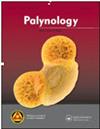北格陵兰下寒武纪有机壁微体化石:多样性的重新评估
IF 1.3
4区 地球科学
Q3 PALEONTOLOGY
引用次数: 1
摘要
摘要早寒武纪布恩组(北格陵兰岛)拥有异常丰富的化石生物群,这对我们了解早期后生动物做出了重大贡献,但该矿床主要生产者的化石遗骸却很少受到关注。在这里,我们研究了布恩组的孢粉学成分,重点是肢端和丝状微体化石。我们的分析揭示了49个形态分类群的存在,其中15个是首次在布恩组中描述的。其中包括可能起源于海底的大型元素,以及囊肿样肢端。Comasphaeridium longisposum Vidal 1993更名为Comasphaveridium?brillessis nom。nov.,和Comasphaeridium denspinosum Vidal 1993被重新分配到一个新属,Pearisphaeridium,成为Pearisphairidium densinosum comb。nov.密棘梨的诊断(Vidal 1993)梳。nov.和Skiagia pura Moczydłowska 1988进行了修订。此外,对回收组合差异的仔细分析表明,在记录的近缘形态分类群中存在许多过渡形态。尽管这些过渡形式中的一些可能代表了具有生物学意义的实体(如生命周期阶段、生态表型),但其他形式似乎是由线粒体过程人工产生的。考虑到地理因素和其他形态变异来源,多样性减少到30种近缘形态类型,其中10种代表了与近缘属大致对应的不同丰度峰。这项分析说明了基于人群的寒武纪早期肢端虫研究如何有助于辨别影响肢端虫形态的不同因素,检测分类膨胀的情况,并完善我们对早古生代食物网基础多样性的测量。本文章由计算机程序翻译,如有差异,请以英文原文为准。
Organic-walled microfossils from the lower Cambrian of North Greenland: a reappraisal of diversity
Abstract The early Cambrian Buen Formation (North Greenland) hosts an exceptionally rich fossil biota that has contributed significantly to our knowledge of early metazoans, yet the fossil remains of primary producers from this deposit have received less attention. Here we examine the palynological component of the Buen Formation, with a focus on acritarchs and filamentous microfossils. Our analysis revealed the presence of 49 form taxa, 15 of which are described for the first time in the Buen Formation. These include large elements of presumably benthic origin, together with cyst-like acritarchs. Comasphaeridium longispinosum Vidal 1993 is renamed Comasphaeridium? brillesensis nom. nov., and Comasphaeridium densispinosum Vidal 1993 is reassigned to a new genus, Pearisphaeridium, becoming Pearisphaeridium densispinosum comb. nov. The diagnoses of Pearisphaeridium densispinosum (Vidal 1993) comb. nov. and Skiagia pura Moczydłowska 1988 are emended. Further, careful analysis of disparity in the recovered assemblage has revealed the presence of numerous transitional morphologies among the recorded acritarch form taxa. Though some of these transitional forms likely represent biologically meaningful entities (e.g. life cycle stages, ecophenotypes), others appear to have been artificially generated by taphonomic processes. Accounting for taphonomic factors and other sources of morphological variation has curtailed diversity down to 30 acritarch morphotypes, ten of which represent distinct abundance peaks broadly corresponding to acritarch genera. This analysis illustrates how population-based studies of early Cambrian acritarchs can help to discern the different factors that impinge on acritarch morphology, detect instances of taxonomic inflation, and refine our measures of diversity at the base of early Palaeozoic food webs.
求助全文
通过发布文献求助,成功后即可免费获取论文全文。
去求助
来源期刊

Palynology
地学-古生物学
CiteScore
3.40
自引率
26.70%
发文量
48
审稿时长
>12 weeks
期刊介绍:
Palynology is an international journal, and covers all aspects of the science. We accept papers on both pre-Quaternary and Quaternary palynology and palaeobotany. Contributions on novel uses of palynology, review articles, book reviews, taxonomic studies and papers on methodology are all actively encouraged.
 求助内容:
求助内容: 应助结果提醒方式:
应助结果提醒方式:


